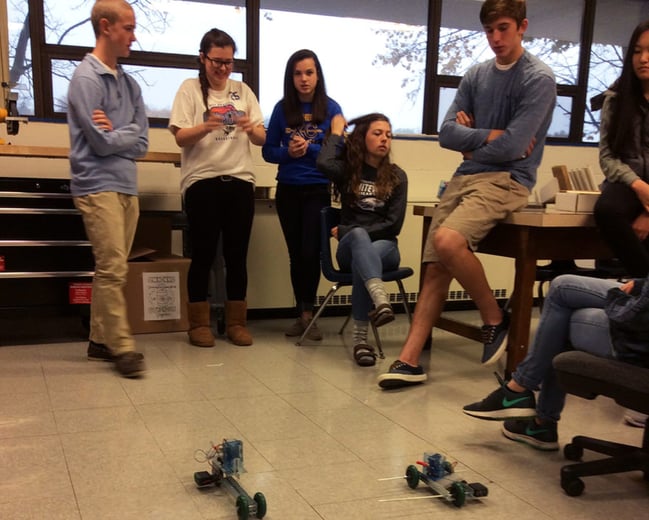Mary Petrie is the Innovation & Entrepreneurship Department chair and a PLTW instructor at Catholic Memorial High School in Waukesha, Wisconsin. Mary has a BS in mechanical engineering and an MA in business administration.
In the six years I have been an instructor at Catholic Memorial High School in Waukesha, Wisconsin, I have had the privilege of teaching three different engineering classes in the PLTW Engineering program. I am continually amazed at all the exciting experiences and opportunities this program provides – and at the achievements of our students. At Catholic Memorial, we offer three classes in the PLTW Engineering program, two classes in the PLTW Computer Science program, and in September 2016, we offered our first class in the PLTW Biomedical Science program. In the past six years, our enrollment has increased 390 percent, and in school year 2016-17, over 25 percent of all CMH students have been enrolled in PLTW electives! As I reflect on the rapid enrollment growth in our PLTW classes, I attribute it to many things.
First, I have witnessed students of many abilities be successful in PLTW classes. Students like the hands-on, innovative approach to problem solving, and the activity-, project-, problem-based (APB) lessons appeal to all learning styles.
Second, the PLTW curriculum supports the teacher’s role as a mentor/coach and allows for the gradual release of the responsibility of learning from the instructor, which then shifts to the student. My experience has been that students want more control of how they learn and are more motivated if they are invested.
Furthermore, students often describe PLTW classes as fun. While I would like to attribute this to my entertaining teaching style, the reality is that the activities are fun. Who wouldn’t want to build a marble sorter or re-engineer a household product? My students would do Instant Challenges every day if I let them!
Another benefit is that PLTW concepts cross many curriculum areas. Often my students will say, “We studied electricity in physics today, and it was so easy because we had it in Principles of Engineering”
Post-secondary opportunities are another reason students enroll in PLTW. Students at CMH have taken advantage of college credit, internships, and presidential scholarships, all of which were made possible by their enrollment in PLTW classes.
My favorite outcome of PLTW classes is that prior to class, students often had no idea what engineering is, nor had any plans to pursue this field of study. After their PLTW experience, many are excited to enter universities with the goal of earning a degree in engineering.
So given all these potential benefits of being in a PLTW class, it is not surprising that our enrollment in the three pathways continues to grow.
Finally, what I consider to be the most important is how PLTW prepares young adults to be contributing members of society. As a parent, teacher, degreed engineer, and business professional, I have witnessed how important the application of PLTW concepts are. One of these concepts is the use of the engineering design process, which has given my students the tools to be innovative, collaborative problem solvers. I’ve seen them arrive at creative solutions to challenges when there is no apparent answer to a problem. In addition to the innovative tools they acquire in PLTW, students learn the importance of working effectively in groups, effective professional communication, ethics in the workplace, and how to manage their time to meet deadlines. While these are only a few of the skills that are developed, they are among the most desired by employers.
I am grateful to be a PLTW instructor. I get to combine my engineering and business background with my passion for teaching. But more important is the opportunity to watch young adults develop valuable skills that are desperately needed in our economy.
PLTW’s blog is intended to serve as a forum for ideas and perspectives from across our network. The opinions expressed are those of each guest author.

